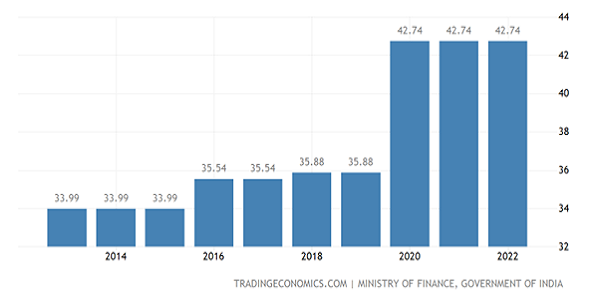As per sub-sections (2) and (3) of Section 17 of the CGST Act, 2017:
(2) Where the goods or services or both are used by the registered person partly for effecting taxable supplies, including zero-rated supplies, under this Act or under the Integrated Goods and Services Tax Act and partly for effecting exempt supplies under the said Acts, the amount of credit shall be restricted to so much of the input tax as is attributable to the said taxable supplies, including zero-rated supplies.
(3) The value of exempt supply under sub-section (2) shall be such as may be prescribed, and shall include supplies on which the recipient is liable to pay tax on reverse charge basis.

Section 17(3) of the CGST Act requires reversal of input tax credit where input and input service is used for making exempt supplies. As per section 17(3) of CGST Act, the value of exempt supply shall include Supply where GST is payable on reverse charge basis – The supplier need to reverse input tax credit as he is not liable to pay tax on outward supplies and Tax is payable by the recipient of such supplies.
So, as read above the provision for reversal of Input Tax is applicable on services chargeable under RCM as well. The section makes no difference between service provided as exempt or as chargeable under RCM.
Equating the services covered under RCM with exempt services is against the very intend of implementation of GST: Removal of cascading effect i.e. Double Taxation or Tax on Tax. RCM is nothing different than the forward charge just that the Tax PAYMENT Liability shifts from the supplier to receiver. It does not make the good or services cheaper or more affordable as in case of exempt services.
Let’s understand this by way of an example.
| Scenario-1 | Scenario-2 | ||
| Value of Supply (Total) | A+B | 1000 | 1000 |
| Under RCM | A | 400 | |
| Under FWD | B | 1000 | 600 |
| GST (Lets assume @18%) | C=(A+B)*18% | 180 | 180 |
| Total ITC | D | 100 | 100 |
| ITC claimable (in proportion to Supply under RCM) | E=D*B/(A+B) | 100 | 60 |
| GST payable by supplier | F=C*B/(A+B) | 180 | 108 |
| Net GST Payable | G=F-E | 80 | 48 |
| GST payable by receiver | H=C*A/(A+B) | – | 72 |
| Total Revenue collection by Govt. | I=G+H | 80 | 120 |
| ITC passed on to receiver | 180 | 180 |
So, as seen above, the collection of the Govt is more in case where the GST payment liability is passed on to the receiver of service while in essence the RCM shifting the payment responsibility. Shifting the payment responsibility does not make it the exempt supply and it cannot be equated with exempt supplies. If supplier makes exempt supply, ITC cannot be claimed and hence the Input Tax forms the part of cost and ultimately receiver pays for it in the form of consideration for supply. While in case of Taxable services, ITC is available and does not form the part of cost. If Input Tax credit benefit is taken away from the Taxable services, supplier will make it part of the cost and buyer will not only have to bear the Tax burden but will also have to pay extra amount for the supply received.
This provision in GST is causing the Cascading effect too as the output tax will be charged on the Input Tax.
Please share your opinion and in case of any further discussion on above article, you can write to me on: pahojashanky@yahoo.com





















Since,the output is not subject to GST, the input tax of GST cannot be taken.
taxupdate.otu@gmail.com
Reliance is supplying petrol and diesel. Same is transported by other company issuing consignment note.
Receiver is paying RCM on transport charges, petroleum is out of GST under the circumstances whether RCM paid amount can be claimed as ITC?